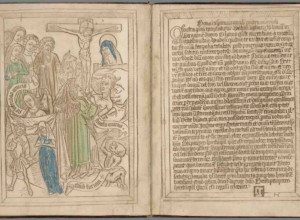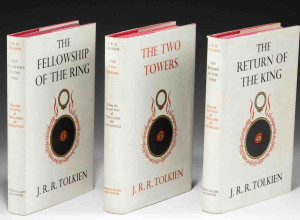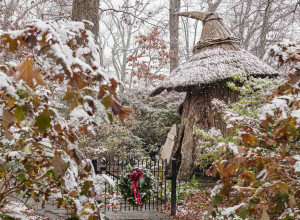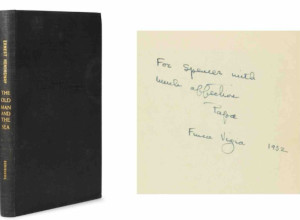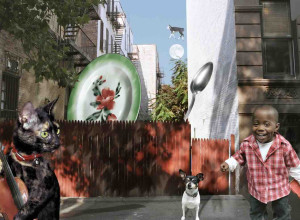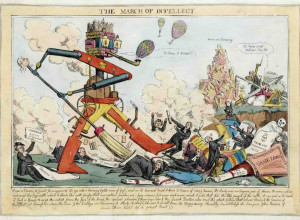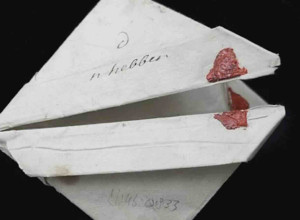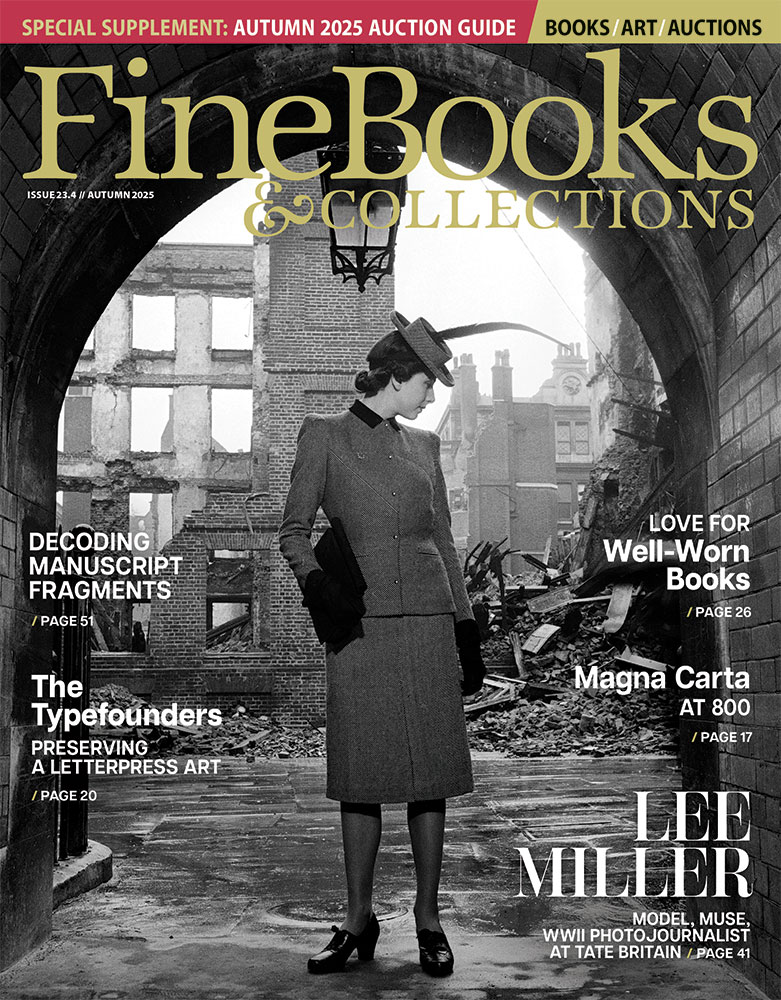Bright Young Things: Brian Cassidy
Our series profiling the next generation of antiquarian booksellers continues today with Brian Cassidy, proprietor of Brian Cassidy, Bookseller in Silver Spring, Maryland:

NP: How did you get started in rare books?
BC: Like a surprising number of rare book dealers, I started out as a poet. I earned an MFA from the University of Iowa Writers Workshop in 1996. After graduating, I planned on teaching and writing. But as teaching positions were often part-time, I began supplementing my income by working in bookstores, the longest (almost five years) at Denver's Tattered Cover. And it was while at the Tattered Cover that I began some amateur book scouting around Denver and Boulder in order to support my book buying habit. I became reasonably proficient at being able to trade books I could find cheaply for more expensive books I actually wanted. After my daughter was born, the idea of that scouting project writ large began to percolate in my mind.
NP: How did you transition from poetry to bookselling?
BC: I've had this conversation with other poet-booksellers, that poetry -- the serious writing and study of it -- is in many ways an excellent preparation for being a book dealer. In my case, I utilized my background in specializing to some extent in poetry and little magazines. But there is also something of the poetic mindset that I think is well-suited for bookselling. The creativity, the curiosity, the focus and attention I learned as a poet have all served me well as a dealer.
NP: When did you open Brian Cassidy, Bookseller?
BC: I established my business in May 2004, and worked out of my house while I stayed at home with my then three-year-old daughter. I sold mostly the books I accumulated while working in bookstores, along with a handful of better finds from my scouting days, and a few gems from my personal collection. It was largely a part-time venture until 2006 when I attended the Colorado Antiquarian Seminar and finally admitted to myself that this -- and not so much poetry or teaching -- was what I wanted to do with my life. Later that year, after a move to the west coast, I bought an existing bookshop in Monterey, CA and went full-time. I was accepted into the ABAA in 2008. In late 2009, my wife, a Naval officer, was transferred to a new job and I closed my shop and moved to the Washington D.C. area where I've worked since. I recently took office space in downtown Silver Spring, MD where I welcome visitors by chance and appointment.
NP: What do you specialize in?
BC: I like to say "the intrinsically interesting, unusual, and unique," which is broad and vague enough to cover almost anything that strikes my fancy. I embrace the curatorial school of bookselling, meaning I see part of my job as sorting through the many books I could handle to find the ones I want to handle. Typically these are books or ephemera about which I feel I have something unique to say or some spin particular to me. Or they are merely items I think are wicked cool or that appeal or speak to me in some way. Which is not to say my own tastes don't tend to coalesce around a few natural areas of focus - poetry, the mimeo revolution, the Beats, The New York School, the 20th century avant garde - or that I don't buy and sell more ordinary books that find their way to me. However, I do attempt to maintain a healthy skepticism around the entire idea of "specialization." I like to think that if I find something interesting, no matter what its particular genre or content, I can make it interesting to someone else as well.
For example, I am currently fascinated with what I term "folk, vernacular, and outsider books." These are unique, typically handmade books - things like scrapbooks, albums, diaries, manuscripts and the like - that to my mind are the rough biblio-equivalent of folk and outsider art or vernacular photography. But these are often items that defy traditional categories of specialization. In large part that is what draws me to them.
NP: Favorite or most interesting book (or etc) you've handled?
I've been fortunate enough to handle some really fantastic Beat items. A few years ago I sold one of Jack Kerouac's personal copies of Ann Charters' bibliography of his work. It had Kerouac's hand corrections throughout, as well as those of Ann and Sam Charters. It was something I scouted up (meaning it had little in the way of provenance) and took almost a year of research before I could authenticate it. It's my favorite not only because of what it was intrinsically, but also because the entire process of researching and verifying its authenticity was both exhilarating and frustrating.
I also was very fond of a collection of original photographs and collages made by William S. Burroughs during the period he was writing NAKED LUNCH that Ken Lopez and I handled together. More recently, I sold two notebooks that belonged to Peter Orlovsky, one of which dated to the beginning of his relationship with Allen Ginsberg during the period Ginsberg was writing HOWL.
NP: What do you personally collect?
BC: I try to keep my own collecting minimal, practical, and as much as possible inexpensive. Otherwise the temptation to hold back material that flows through the business can be too great. To that end, like many booksellers, I collect books on books. Most of these are reference materials, bibliographies and the like. But I also like books on the history of bookselling, and have a special fondness for bookseller memoirs.
My largest personal collection by far, however, is books with compelling or revealing owner alterations. These can be anything from marginalia and inscriptions (non-authorial, non-association) to more outward changes. For example, I have a book that was in the Jonestown Flood. I look for books that physically tell a story about how they were used (or abused) by ordinary people.
NP: What do you love about the book trade?
BC: That someone pushing 40 (I'm 39) could for the purposes of this interview be considered "young."
But to take your question more seriously, I love that the business affords me the chance to constantly learn new things and how it allows me to follow and capitalize on my own interests and obsessions.
NP: Any thoughts to share on young collectors and the future of the book trade?
BC: When I hear older dealers lament the demise of the book, or how younger people don't read etc., I honestly feel like we're living in different worlds. People are interacting with the written word more now than at any time in human history - texts, email, blogs, the internet, ebooks, Kindles, etc. - and this can only bode well for the future of the book and collecting. Yes, the book and our concept of it is changing. And yes, collecting habits and interests will evolve with it. But the idea that people will stop collecting is nonsense. They'll just collect different things. It will be up to new generations of dealers to recognize these emerging collecting areas as well as to take them up and promote them further - even to take the lead and make the argument for neglected corners of our cultural heritage.
Because at our core, book dealers have always been purveyors, not of books per se, but of culture. For a very long time, the book was the primary repository of that culture. As the infrastructure of our cultural ecosystem diversifies, however, so must what the book dealer handles. This will continue to mean everything from The King James Bible and the Kelmscott Chaucer to Hemingway and Stephen King. But it will also mean punk rock flyers and old computer manuals, zines and amateur photographs, home movies and video tapes, and maybe someday even Atari cartridges. Or Kindles. Or the archive of original HTML files to a seminal blog like Boing Boing. I think it's only a matter of time before we start seeing "first editions" of landmark video games at bookfairs, for example.
NP: Tell us about your upcoming catalogue and how to obtain a copy:
BC: My sixth catalogue should be going to press shortly after you read this and be available by the second week of February. Some highlights include: a rare complete set of invitations to Andy Warhol's first retrospective (from the estate of the exhibit's curator), several good Beat associations, an original poster from Patti Smith's first reading/performance, a complete set of original and striking silk-screens posters from the debut of John Cage's HPSCHD, and a fascinating archive of notebooks and original art from a British trainspotter. Also poetry, the mimeo revolution, modern literature, the counterculture, and assorted other odds and ends. Readers interested in obtaining a copy and/or in being notified when it is available online can either email me at books@briancassidy.net or join the mailing list by filling out the online form on my website.


NP: How did you get started in rare books?
BC: Like a surprising number of rare book dealers, I started out as a poet. I earned an MFA from the University of Iowa Writers Workshop in 1996. After graduating, I planned on teaching and writing. But as teaching positions were often part-time, I began supplementing my income by working in bookstores, the longest (almost five years) at Denver's Tattered Cover. And it was while at the Tattered Cover that I began some amateur book scouting around Denver and Boulder in order to support my book buying habit. I became reasonably proficient at being able to trade books I could find cheaply for more expensive books I actually wanted. After my daughter was born, the idea of that scouting project writ large began to percolate in my mind.
NP: How did you transition from poetry to bookselling?
BC: I've had this conversation with other poet-booksellers, that poetry -- the serious writing and study of it -- is in many ways an excellent preparation for being a book dealer. In my case, I utilized my background in specializing to some extent in poetry and little magazines. But there is also something of the poetic mindset that I think is well-suited for bookselling. The creativity, the curiosity, the focus and attention I learned as a poet have all served me well as a dealer.
NP: When did you open Brian Cassidy, Bookseller?
BC: I established my business in May 2004, and worked out of my house while I stayed at home with my then three-year-old daughter. I sold mostly the books I accumulated while working in bookstores, along with a handful of better finds from my scouting days, and a few gems from my personal collection. It was largely a part-time venture until 2006 when I attended the Colorado Antiquarian Seminar and finally admitted to myself that this -- and not so much poetry or teaching -- was what I wanted to do with my life. Later that year, after a move to the west coast, I bought an existing bookshop in Monterey, CA and went full-time. I was accepted into the ABAA in 2008. In late 2009, my wife, a Naval officer, was transferred to a new job and I closed my shop and moved to the Washington D.C. area where I've worked since. I recently took office space in downtown Silver Spring, MD where I welcome visitors by chance and appointment.
NP: What do you specialize in?
BC: I like to say "the intrinsically interesting, unusual, and unique," which is broad and vague enough to cover almost anything that strikes my fancy. I embrace the curatorial school of bookselling, meaning I see part of my job as sorting through the many books I could handle to find the ones I want to handle. Typically these are books or ephemera about which I feel I have something unique to say or some spin particular to me. Or they are merely items I think are wicked cool or that appeal or speak to me in some way. Which is not to say my own tastes don't tend to coalesce around a few natural areas of focus - poetry, the mimeo revolution, the Beats, The New York School, the 20th century avant garde - or that I don't buy and sell more ordinary books that find their way to me. However, I do attempt to maintain a healthy skepticism around the entire idea of "specialization." I like to think that if I find something interesting, no matter what its particular genre or content, I can make it interesting to someone else as well.
For example, I am currently fascinated with what I term "folk, vernacular, and outsider books." These are unique, typically handmade books - things like scrapbooks, albums, diaries, manuscripts and the like - that to my mind are the rough biblio-equivalent of folk and outsider art or vernacular photography. But these are often items that defy traditional categories of specialization. In large part that is what draws me to them.
NP: Favorite or most interesting book (or etc) you've handled?
I've been fortunate enough to handle some really fantastic Beat items. A few years ago I sold one of Jack Kerouac's personal copies of Ann Charters' bibliography of his work. It had Kerouac's hand corrections throughout, as well as those of Ann and Sam Charters. It was something I scouted up (meaning it had little in the way of provenance) and took almost a year of research before I could authenticate it. It's my favorite not only because of what it was intrinsically, but also because the entire process of researching and verifying its authenticity was both exhilarating and frustrating.
I also was very fond of a collection of original photographs and collages made by William S. Burroughs during the period he was writing NAKED LUNCH that Ken Lopez and I handled together. More recently, I sold two notebooks that belonged to Peter Orlovsky, one of which dated to the beginning of his relationship with Allen Ginsberg during the period Ginsberg was writing HOWL.
NP: What do you personally collect?
BC: I try to keep my own collecting minimal, practical, and as much as possible inexpensive. Otherwise the temptation to hold back material that flows through the business can be too great. To that end, like many booksellers, I collect books on books. Most of these are reference materials, bibliographies and the like. But I also like books on the history of bookselling, and have a special fondness for bookseller memoirs.
My largest personal collection by far, however, is books with compelling or revealing owner alterations. These can be anything from marginalia and inscriptions (non-authorial, non-association) to more outward changes. For example, I have a book that was in the Jonestown Flood. I look for books that physically tell a story about how they were used (or abused) by ordinary people.
NP: What do you love about the book trade?
BC: That someone pushing 40 (I'm 39) could for the purposes of this interview be considered "young."
But to take your question more seriously, I love that the business affords me the chance to constantly learn new things and how it allows me to follow and capitalize on my own interests and obsessions.
NP: Any thoughts to share on young collectors and the future of the book trade?
BC: When I hear older dealers lament the demise of the book, or how younger people don't read etc., I honestly feel like we're living in different worlds. People are interacting with the written word more now than at any time in human history - texts, email, blogs, the internet, ebooks, Kindles, etc. - and this can only bode well for the future of the book and collecting. Yes, the book and our concept of it is changing. And yes, collecting habits and interests will evolve with it. But the idea that people will stop collecting is nonsense. They'll just collect different things. It will be up to new generations of dealers to recognize these emerging collecting areas as well as to take them up and promote them further - even to take the lead and make the argument for neglected corners of our cultural heritage.
Because at our core, book dealers have always been purveyors, not of books per se, but of culture. For a very long time, the book was the primary repository of that culture. As the infrastructure of our cultural ecosystem diversifies, however, so must what the book dealer handles. This will continue to mean everything from The King James Bible and the Kelmscott Chaucer to Hemingway and Stephen King. But it will also mean punk rock flyers and old computer manuals, zines and amateur photographs, home movies and video tapes, and maybe someday even Atari cartridges. Or Kindles. Or the archive of original HTML files to a seminal blog like Boing Boing. I think it's only a matter of time before we start seeing "first editions" of landmark video games at bookfairs, for example.
NP: Tell us about your upcoming catalogue and how to obtain a copy:
BC: My sixth catalogue should be going to press shortly after you read this and be available by the second week of February. Some highlights include: a rare complete set of invitations to Andy Warhol's first retrospective (from the estate of the exhibit's curator), several good Beat associations, an original poster from Patti Smith's first reading/performance, a complete set of original and striking silk-screens posters from the debut of John Cage's HPSCHD, and a fascinating archive of notebooks and original art from a British trainspotter. Also poetry, the mimeo revolution, modern literature, the counterculture, and assorted other odds and ends. Readers interested in obtaining a copy and/or in being notified when it is available online can either email me at books@briancassidy.net or join the mailing list by filling out the online form on my website.






